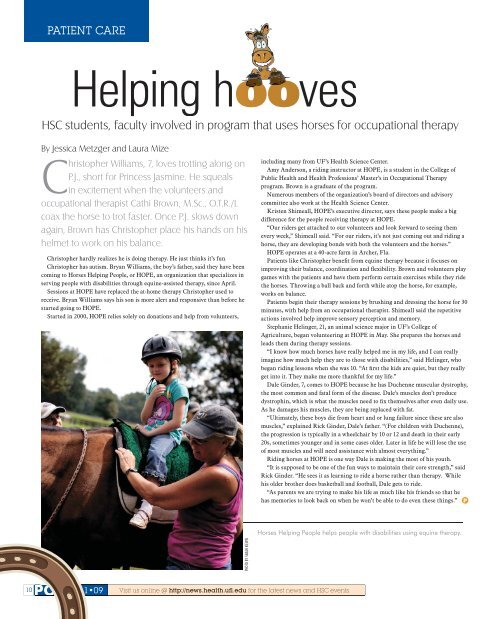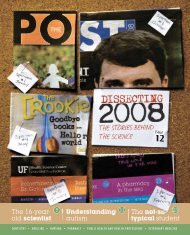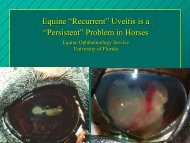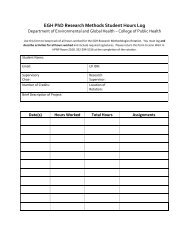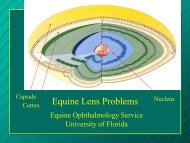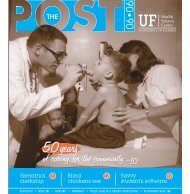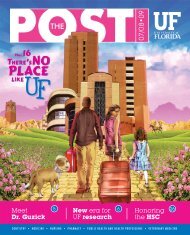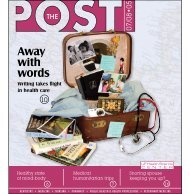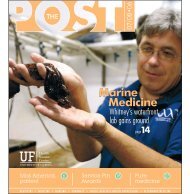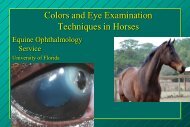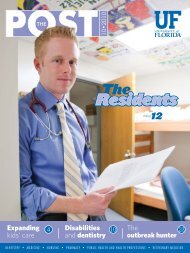New hospital opens PHHP names new dean - University of Florida
New hospital opens PHHP names new dean - University of Florida
New hospital opens PHHP names new dean - University of Florida
You also want an ePaper? Increase the reach of your titles
YUMPU automatically turns print PDFs into web optimized ePapers that Google loves.
PATIENT CARE<br />
Helping h ves<br />
HSC students, faculty involved in program that uses horses for occupational therapy<br />
By Jessica Metzger and Laura Mize<br />
Christopher Williams, 7, loves trotting along on<br />
P.J., short for Princess Jasmine. He squeals<br />
in excitement when the volunteers and<br />
occupational therapist Cathi Brown, M.Sc., O.T.R./L<br />
coax the horse to trot faster. Once P.J. slows down<br />
again, Brown has Christopher place his hands on his<br />
helmet to work on his balance.<br />
Christopher hardly realizes he is doing therapy. He just thinks it’s fun.<br />
Christopher has autism. Bryan Williams, the boy’s father, said they have been<br />
coming to Horses Helping People, or HOPE, an organization that specializes in<br />
serving people with disabilities through equine-assisted therapy, since April.<br />
Sessions at HOPE have replaced the at-home therapy Christopher used to<br />
receive. Bryan Williams says his son is more alert and responsive than before he<br />
started going to HOPE.<br />
Started in 2000, HOPE relies solely on donations and help from volunteers,<br />
10POST POST<br />
11 09<br />
Visit us online @ http://<strong>new</strong>s.health.ufl .edu for the latest <strong>new</strong>s and HSC events.<br />
PHOTO BY SARAH KIEWEL<br />
including many from UF’s Health Science Center.<br />
Amy Anderson, a riding instructor at HOPE, is a student in the College <strong>of</strong><br />
Public Health and Health Pr<strong>of</strong>essions’ Master’s in Occupational Therapy<br />
program. Brown is a graduate <strong>of</strong> the program.<br />
Numerous members <strong>of</strong> the organization’s board <strong>of</strong> directors and advisory<br />
committee also work at the Health Science Center.<br />
Kristen Shimeall, HOPE’s executive director, says these people make a big<br />
difference for the people receiving therapy at HOPE.<br />
“Our riders get attached to our volunteers and look forward to seeing them<br />
every week,” Shimeall said. “For our riders, it’s not just coming out and riding a<br />
horse, they are developing bonds with both the volunteers and the horses.”<br />
HOPE operates at a 40-acre farm in Archer, Fla.<br />
Patients like Christopher benefi t from equine therapy because it focuses on<br />
improving their balance, coordination and fl exibility. Brown and volunteers play<br />
games with the patients and have them perform certain exercises while they ride<br />
the horses. Throwing a ball back and forth while atop the horse, for example,<br />
works on balance.<br />
Patients begin their therapy sessions by brushing and dressing the horse for 30<br />
minutes, with help from an occupational therapist. Shimeall said the repetitive<br />
actions involved help improve sensory perception and memory.<br />
Stephanie Helinger, 21, an animal science major in UF’s College <strong>of</strong><br />
Agriculture, began volunteering at HOPE in May. She prepares the horses and<br />
leads them during therapy sessions.<br />
“I know how much horses have really helped me in my life, and I can really<br />
imagine how much help they are to those with disabilities,” said Helinger, who<br />
began riding lessons when she was 10. “At fi rst the kids are quiet, but they really<br />
get into it. They make me more thankful for my life.”<br />
Dale Ginder, 7, comes to HOPE because he has Duchenne muscular dystrophy,<br />
the most common and fatal form <strong>of</strong> the disease. Dale’s muscles don’t produce<br />
dystrophin, which is what the muscles need to fi x themselves after even daily use.<br />
As he damages his muscles, they are being replaced with fat.<br />
“Ultimately, these boys die from heart and or lung failure since these are also<br />
muscles,” explained Rick Ginder, Dale’s father. “(For children with Duchenne),<br />
the progression is typically in a wheelchair by 10 or 12 and death in their early<br />
20s, sometimes younger and in some cases older. Later in life he will lose the use<br />
<strong>of</strong> most muscles and will need assistance with almost everything.”<br />
Riding horses at HOPE is one way Dale is making the most <strong>of</strong> his youth.<br />
“It is supposed to be one <strong>of</strong> the fun ways to maintain their core strength,” said<br />
Rick Ginder. “He sees it as learning to ride a horse rather than therapy. While<br />
his older brother does basketball and football, Dale gets to ride.<br />
“As parents we are trying to make his life as much like his friends so that he<br />
has memories to look back on when he won’t be able to do even these things.” P<br />
Horses Helping People helps people with disabilities using equine therapy.


